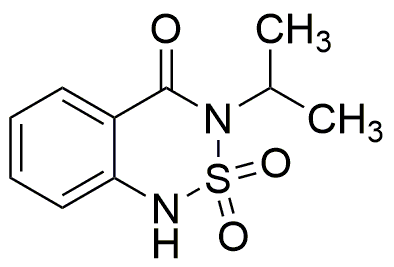Bentazon is widely utilized in research focused on:
- Agricultural Herbicide: Commonly used in agriculture, Bentazon effectively controls broadleaf weeds in crops like soybeans and peanuts, helping farmers maintain healthy yields.
- Environmental Studies: Researchers use Bentazon to study its environmental impact, particularly its behavior in soil and water, which is crucial for assessing herbicide runoff and its effects on ecosystems.
- Crop Protection Research: In plant science, Bentazon serves as a model compound for developing new herbicides, allowing scientists to explore more sustainable and effective weed management strategies.
- Analytical Chemistry: Bentazon is often analyzed in laboratories to develop and validate methods for detecting pesticide residues in food products, ensuring consumer safety and compliance with regulations.
- Phytotoxicity Studies: It is used in phytotoxicity tests to evaluate the potential harmful effects of herbicides on non-target plants, helping to inform safer application practices.
Informations générales
Propriétés
Sécurité et réglementation
Applications
Bentazon is widely utilized in research focused on:
- Agricultural Herbicide: Commonly used in agriculture, Bentazon effectively controls broadleaf weeds in crops like soybeans and peanuts, helping farmers maintain healthy yields.
- Environmental Studies: Researchers use Bentazon to study its environmental impact, particularly its behavior in soil and water, which is crucial for assessing herbicide runoff and its effects on ecosystems.
- Crop Protection Research: In plant science, Bentazon serves as a model compound for developing new herbicides, allowing scientists to explore more sustainable and effective weed management strategies.
- Analytical Chemistry: Bentazon is often analyzed in laboratories to develop and validate methods for detecting pesticide residues in food products, ensuring consumer safety and compliance with regulations.
- Phytotoxicity Studies: It is used in phytotoxicity tests to evaluate the potential harmful effects of herbicides on non-target plants, helping to inform safer application practices.
Documents
Fiches de données de sécurité (FDS)
La FDS fournit des informations de sécurité complètes sur la manipulation, le stockage et l’élimination du produit.
Spécifications du produit (PS)
Le PS fournit une description complète des propriétés du produit, notamment sa composition chimique, son état physique, sa pureté et les exigences de stockage. Il détaille également les plages de qualité acceptables et les applications prévues du produit.
Certificats d'analyse (COA)
Recherchez des certificats d'analyse (COA) en saisissant le numéro de lot du produit. Les numéros de lot et de lot se trouvent sur l'étiquette d'un produit, après les mots « Lot » ou « Lot de fabrication ».
Numéro de catalogue
Numéro de lot/série
Certificats d'origine (COO)
Ce certificat d'exploitation confirme le pays dans lequel le produit a été fabriqué, et détaille également les matériaux et composants utilisés et s'il est issu de sources naturelles, synthétiques ou autres sources spécifiques. Ce certificat peut être requis pour les douanes, le commerce et la conformité réglementaire.
Numéro de catalogue
Numéro de lot/série
Fiches de données de sécurité (FDS)
La FDS fournit des informations de sécurité complètes sur la manipulation, le stockage et l’élimination du produit.
DownloadSpécifications du produit (PS)
Le PS fournit une description complète des propriétés du produit, notamment sa composition chimique, son état physique, sa pureté et les exigences de stockage. Il détaille également les plages de qualité acceptables et les applications prévues du produit.
DownloadCertificats d'analyse (COA)
Recherchez des certificats d'analyse (COA) en saisissant le numéro de lot du produit. Les numéros de lot et de lot se trouvent sur l'étiquette d'un produit, après les mots « Lot » ou « Lot de fabrication ».
Numéro de catalogue
Numéro de lot/série
Certificats d'origine (COO)
Ce certificat d'exploitation confirme le pays dans lequel le produit a été fabriqué, et détaille également les matériaux et composants utilisés et s'il est issu de sources naturelles, synthétiques ou autres sources spécifiques. Ce certificat peut être requis pour les douanes, le commerce et la conformité réglementaire.


